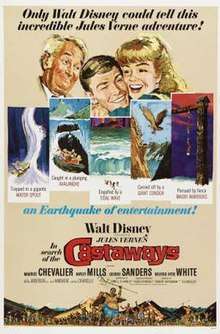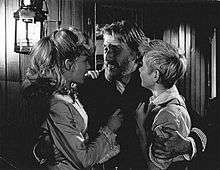In Search of the Castaways (film)
| In Search of the Castaways | |
|---|---|
 Film poster | |
| Directed by | Robert Stevenson |
| Produced by |
Associate Producer: Hugh Attwooll |
| Written by |
Lowell S. Hawley Jules Verne (Novel) |
| Starring |
Hayley Mills Maurice Chevalier George Sanders Wilfrid Hyde-White Keith Hamshere Jack Gwillim Wilfrid Brambell |
| Music by |
Music Composed by: William Alwyn Musical Director: Muir Mathieson Songs: Richard Sherman Robert Sherman |
| Cinematography | Paul Beeson |
| Edited by | Gordon Stone |
Production company | |
| Distributed by | Buena Vista Distribution |
Release date | December 21, 1962 |
Running time | 98 minutes |
| Country | United States |
| Language | English |
| Box office | $21,745,500[1] |

In Search of the Castaways is a 1962 Walt Disney Productions feature film starring Hayley Mills and Maurice Chevalier in a tale about a worldwide search for a shipwrecked sea captain. The film was directed by Robert Stevenson from a screenplay by Lowell S. Hawley freely based upon Jules Verne's 1868 adventure novel Captain Grant's Children. The film was Mills' third of six for the Disney Studios.
Plot
In England in the 19th century, Professor Paganel (Maurice Chevalier), a whimsical French geography professor, finds a bottle containing a note which he believes to have been written by the missing Captain John Grant (Jack Gwillim). Paganel and Grant's two teenaged children, Mary (Hayley Mills) and Robert (Keith Hamshere), and Lord Glenarvan's son, John (Michael Anderson, Jr.) approach wealthy shipping magnate Lord Glenarvan (Wilfrid Hyde-White), the owner of Captain Grant's ship, and persuade him to finance a search expedition. The expedition sets sail and ventures halfway around the world to South America.
In the Andes an earthquake sends them down a mountain on a glacier. A giant condor snatches up Robert but Thalcave (Antonio Cifariello), an Indian chief, rescues him. He later claims to know the whereabouts of Captain Grant. After surviving a tidal wave and a lightning storm, the group discovers that the well-meaning Thalcave was mistaken. Meanwhile, a budding romance develops between young Mary Grant and Lord Glenarvan's son John.
They then depart for Australia, where Paganel feels sure they will find Captain Grant. In Melbourne they meet a treacherous gunrunner, Thomas Ayerton (George Sanders), who produces evidence that Captain Grant is in New Zealand. Unaware that Ayerton is the third mate who caused a mutiny on Grant's ship, the search party once more sets sail. Ayerton causes another mutiny and sets the group adrift. They are captured by Maori cannibals but escape to a volcano. They evade their pursuers by starting an avalanche which triggers off an eruption.
They finally find Captain Grant, overcome Ayerton and his mutineers, and sail for home.
Cast and characters
- Hayley Mills as Mary Grant
- Maurice Chevalier as Jacques Paganel
- George Sanders as Thomas Ayerton
- Wilfrid Hyde-White as Lord Glenarvan
- Michael Anderson, Jr. as John Glenarvan
- Antonio Cifariello as Thalcave, the Indian Chief
- Keith Hamshere as Robert Grant
- Wilfrid Brambell as Bill Gaye
- Jack Gwillim as Captain Grant
- Inia Te Wiata as Maori Chief
- Ronald Fraser as Guard at Dockyard Gate
- Norman Bird as Senior Yacht Guard
- George Murcell as Ayerton's Assistant
- Mark Dignam as Rich Man at Yacht Party
- Michael Wynne as Crooked Sailor
- David Spenser as South American Guide
- Milo Sperber as Crooked Sailor
- Roger Delgado as Patagonian Prisoner
- Barry Keegan as Irish Claimant
- Maxwell Shaw as Sailor
- Andreas Malandrinos as Crooked Sailor
Musical numbers
Songs composed by the Sherman Brothers include "Castaway", "Merci Beaucoup", "Let's Climb (Grimpons)", and "Enjoy It", with an orchestral arrangement of "Castaway" serving as the film's overture.
Reception
In Search of the Castaways was a commercial hit. It grossed $18,415,385 domestically,[2] earning $5 million in US theatrical rentals.[3] At the worldwide box office, the film earned $21,745,500.[1] In the US, it was the 3rd highest-grossing film of 1962.
It was one of the 12 most popular movies at the British box office in 1963.[4]
Awards and nominations
The film placed third in the 1963 Golden Laurel Top Male Musical Performance (Chevalier) and was nominated for the Golden Laurel Top Action Drama.
Other adaptations of Verne's novel
Verne's tale has seen two Russian film adaptations (1936, 1985) and a Spanish operetta.
See also
References
- 1 2 Box Office Information for In Search of the Castaways. Worldwide Box Office. Retrieved June 13, 2013.
- ↑ Box Office Information for In Search of the Castaways. The Numbers. Retrieved June 13, 2013.
- ↑ "All-Time Top Grossers", Variety, 8 January 1964 pg 69
- ↑ "Most Popular Films Of 1963." Times [London, England] 3 Jan. 1964: 4. The Times Digital Archive. Web. 11 July 2012.